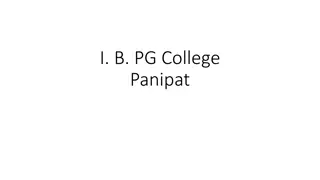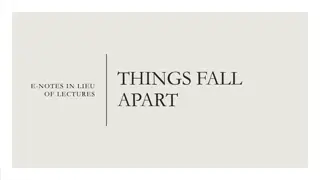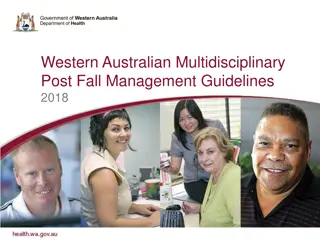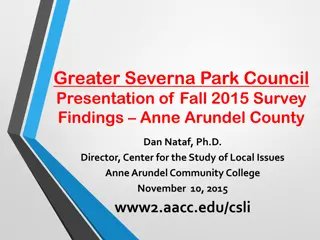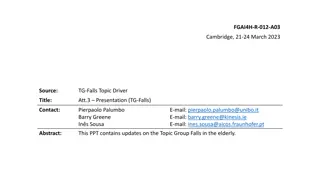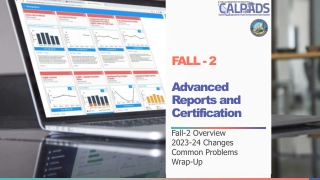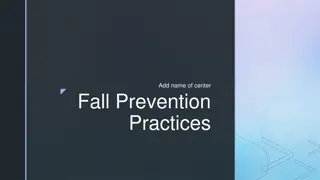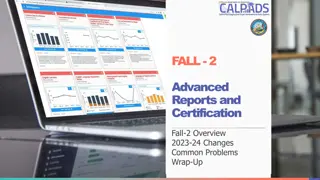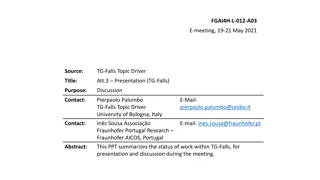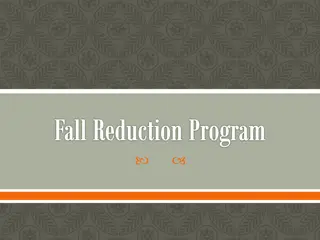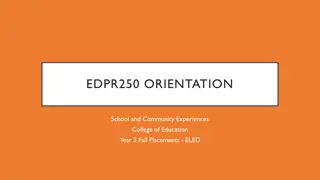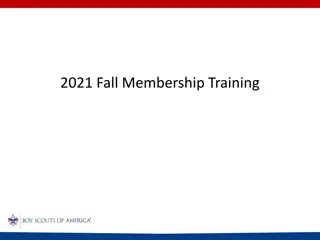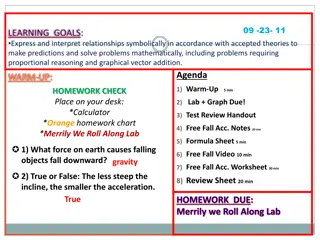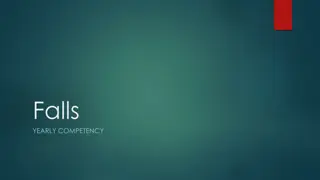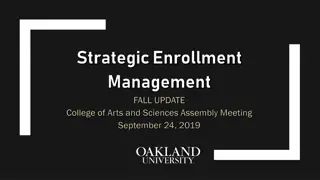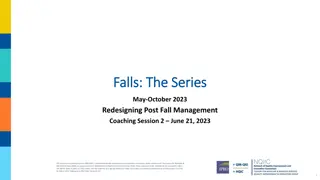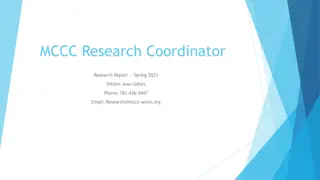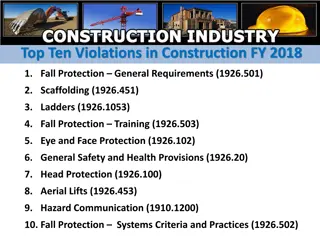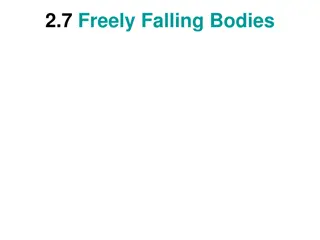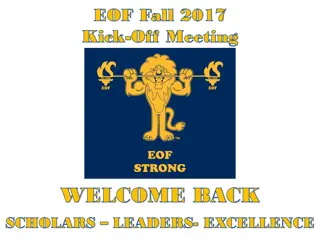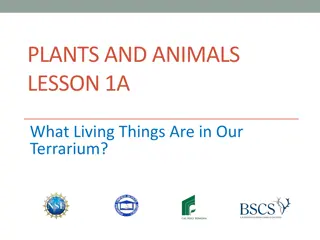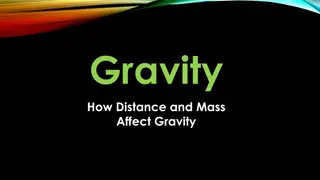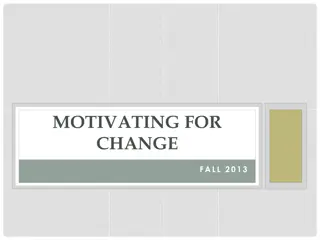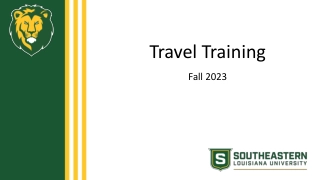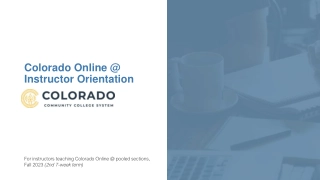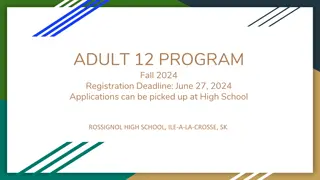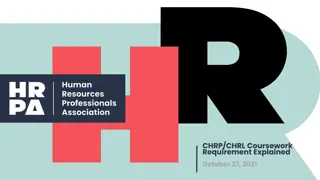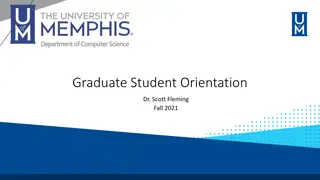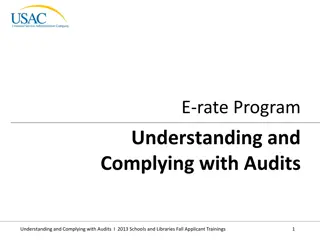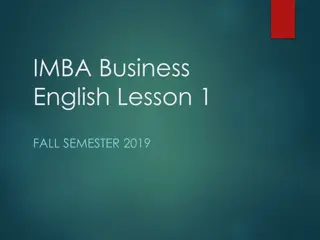Explore "Things Fall Apart" by Chinua Achebe
Dive into Chinua Achebe's classic novel "Things Fall Apart" and learn about the author, predictions for the story, pronunciations of key names, and the significance of proverbs and folktales in the Igbo culture portrayed in the book.
Download Presentation

Please find below an Image/Link to download the presentation.
The content on the website is provided AS IS for your information and personal use only. It may not be sold, licensed, or shared on other websites without obtaining consent from the author. Download presentation by click this link. If you encounter any issues during the download, it is possible that the publisher has removed the file from their server.
E N D
Presentation Transcript
Things Fall Apart Chinua Achebe
About the Author Chinua Achebe (1930 2013), the son of a Christian minister, was one of Nigeria s most celebrated novelists. Born an Ibo in Ogidi, Nigeria, in 1930, Achebe was educated in English. Achebe taught English at the university level at colleges in Africa and the United States. His first and best-known novel, Things Fall Apart, was published in 1958. Achebe wrote several novels, short story collections, and books of essays.
Predictions As you examine the cover and epigraph of Things Fall Apart, what predictions can you make about the novel? Consider the title. To what things might Achebe be referring? Look up the definition of epigraph if you don t know what it means and add the definition to your Unit 3 notes.
Pronunciations Copy the following names and pronunciations onto a blank bookmark supplied by your teacher. Things Fall Apart focuses on a culture that may be unfamiliar to you. Even though the novel is written in English, the author uses words and phrases from his native Ibo language. Review the glossary at the back of the novel. Add additional words and definitions to your bookmark as you read. Consider including: chi, ilo, nza, and obi.
Copy these names and pronunciations onto your bookmark Achebe (Ah-chay-bay) Chinua ( Chin-oo-ah) Ekwefi (Eh-kweh-fee) Ezinma (Eh-zeen-mah) Ikemefuna (Ee-keh-meh-foo-nah) Obierika (Oh-bee-air-ee-kah) Nwoye (Nuh-woh-yeh) Ojiubo (Oh-jee-ooh-boh) Okonkwo (Oh-kawn-kwoh) Umuofia (Oo-moo-oh-fee-ah) Unoka (Ooh-no-kah)
Proverbs and Folktales Learning Targets: Examine thematic connections between proverbs and folktales. Predict how and why an author uses proverbs and fables in a novel.
Proverbs and folktales Proverbs and folktales are one part of a culture s oral tradition. People share proverbs and folktales in order to express important stories, ideas, and beliefs about their culture. As you read the novel Things Fall Apart, you will encounter many proverbs and folktales that illustrate the beliefs of the Ibo people. One memorable Ibo proverb is Proverbs are the palm oil with which words are eaten. Explain what you think this proverb means.
Proverbs and Folktales Proverb Explanation If a child washes his hands, he could eat with kings. When the moon is shining, the cripple becomes hungry for a walk. Since men have learned to shoot without missing, [the bird] has learned to fly without perching. The clan was like a lizard. If it lost its tail it soon grew another. I cannot live on the bank of a river and wash my hands with spittle. A man who pays respect to the great paves the way for his own greatness.
Proverbs and Folktales Proverb Explanation Cleanliness is a virtue (e.g., cleanliness is next to godliness). If a child washes his hands, he could eat with kings. Some opportunities are just too good to resist. When the moon is shining, the cripple becomes hungry for a walk. Adaptation is the key to survival. Since men have learned to shoot without missing, [the bird] has learned to fly without perching. If a role within the community became vacant, someone would soon fill it. The clan was like a lizard. If it lost its tail it soon grew another. Why should I settle for less, when I could have better? I cannot live on the bank of a river and wash my hands with spittle. One is more likely to receive respect when one shows respect to others. A man who pays respect to the great paves the way for his own greatness.
Entry Task February 17, 2016 Respond to the following questions in the Entry Task section of your notebook. Try to write page. How are father/son relationships complicated? What might fathers and sons have in common? What might make them different?
SB Activity 3.5: Father and Son Learning Targets: Analyze how a complex character interacts with other characters. Analyze how a complex character s motivation advances the plot. Literary Terms: Define these terms: Motif Foil
As you read, use the organizer below or create one of your own to compare and contrast Okonkwo and his father.Record facts and details about each.
Language and Writers Craft: Active and Passive Voice Active voice occurs when the subject of a sentence performs the action; for example: In the end, Okonkwo threw the Cat. Okonkwo performs the action of throwing. Passive voice is when the subject of the sentence receives the action; for example: The Cat was thrown by Okonkwo. Use active voice in your writing to enhance clarity.
Writing Prompt How is Okonkwo s character influenced by his complex relationship with his father? Be sure to: Include a topic sentence that compares or contrasts the two characters. Use specific details and quotations from the novel as support. Use active voice.
Entry Task Listen to the song Father and Son by Cat Stevens. Jot down the main idea/theme of the song. How is the father archetype portrayed in this song? How is it similar or different than how the father archetype is portrayed in Things Fall Apart?
Double-Entry Journal Look for examples of Okonkwo s feelings and fears, the reasons for those fears, and the effect they have on his actions. Also look for a motif or foil. Include textual evidence from each chapter in the left-hand column. Write your personal response or interpretation in the right-hand column.
Double-Entry Journal Feelings and Fears: Passage from the Text Personal Response or Interpretation Example: But his whole life was dominated by fear, the fear of failure and of weakness. (Ch. 2) I wonder why Okonkwo is so afraid. How could he be a successful wrestler if he is dominated by fear?
Double-Entry Journal Feelings and Fears: Passage from the Text Personal Response or Interpretation Example: But his whole life was dominated by fear, the fear of failure and of weakness. (Ch. 2) He had no patience with unsuccessful men. (Ch. 1) I wonder why Okonkwo is so afraid. How could he be a successful wrestler if he is dominated by fear? Okonkwo s frustration with his father s faults carries over into his feelings towards others. Okonkwo s first son, Nwoye, was then twelve years old but was already causing his father great anxiety for his incipient laziness. (Ch. 2) And indeed he was possessed by the fear of his father s contemptible life and shameful death. (Ch.3) Okonkwo never showed any emotion openly, unless it be the emotion of anger. To show affection was a sign of weakness; the only thing worth demonstrating was strength. (Ch.4) Since Okonkwo s father is dead, his son is taking over as a foil. Father/son tension may be a motif. Okonkwo became prosperous because of his fear of being like his father. Can a lazy father be more inspiring than a hardworking father? Okonkwo s character is warped by his desire not to appear weak like his father. The only emotion he is willing to show is anger.
Entry Task February 24, 2016 Listen to the song Cat s in the Cradle by Harry Chapin. Jot down the main idea/theme of the song. How is the father archetype portrayed in this song? How is it similar or different than how the father archetype is portrayed in Things Fall Apart?
Check Your Understanding What conflicts already existed in the Ibo culture before the arrival of the colonists? How is Unoka (Okonkwo s father) set up as a foil to Okonkwo? Predict how father/son tensions could be a motif in this novel.
Literary Analysis Paper After completing Things Fall Apart, everyone will write a Literary Analysis Paper on the following prompt: Analyze how the depiction of __________ shapes the meaning of the work as a whole. You should look especially at how the introduction of colonialism affects the meaning that surrounds your area of inquiry. Father / Son Relationships What Makes A Society Civilized Cultural Collisions (Conflict) Gender Roles The Use Of Violence Acts Of Sacrifice
Character in Conflict Fill in the chart below to explore the conflicting sides of Okonkwo s character. Okonkwo s Achievements and Status Negative Traits and Actions
Character in Conflict Okonkwo s Achievements and Status Negative Traits and Actions A great wrestler Wealthy farmer A great warrior Hard worker Religious Respectful to community elders Supported his mother and sisters Doesn t give up Careful farmer Rose to greatness from poverty Hot temper Fear of weakness Fear of being like his father Nags and beats his son Insults unsuccessful men Can t show emotion Beats his wife Forgets the Week of Peace Won t admit wrongdoing Critical of his sons
Create the graphic organizer to begin Okonkwo s family tree.
Creating an Ibo Tableau Work with your group members to create a tableau (a freeze-frame snapshot) of characters from Things Fall Apart. Review the basic facts about your character. Write a short statement that your character will give. The statement should begin with I am ; then state your character s name and reveal an interesting fact about that character. Just as the characters positions in the tableau will explain their relationships with one another, try to let the lines you write and the way you deliver them reveal your character s attitude and personality. Work with your group to decide where each character should stand, how he or she should pose, and where he or she should be positioned in relation to others. Be prepared to present your tableau to the class. You and fellow characters should strike the pose and then step out of the freeze-frame one at a time to deliver your lines.
Entry Task Respond to the following question: What is your definition of a civilized society? A civilized society is one in which . Be prepared to share your ideas with the class.
Is the Ibo culture, as presented in the novel, a civilized society? Yes No
Is the Ibo culture, as presented in the novel, a civilized society? Yes No They have strong religious beliefs: they celebrate and respect the Week of Peace. Their culture rewards hard work: Okonkwo is respected and given authority due to his industrious nature. They have a strong sense of community and justice: there are customs in place to avoid war, such as the treaty in which Ikemefuna was sent to Umuofia as atonement. They respect familial bonds: Okonkwo supports his mother and the rest of his family when he begins to make money. They are violent: Okonkwo beats his wife for a minor offense. They kill human beings: Ikemefuna is slaughtered senselessly, and twins are left to die in the forest. They have flexible matrimonial bonds: men take multiple wives and Ekwefi left her first husband for Okonkwo. They drink alcohol and admire men for their wrestling skills.
Writing Prompt Explain how the Ibo culture depicted in Things Fall Apart represents a civilized or uncivilized society. Be sure to: Include a thesis statement that responds to the prompt. Include textual evidence from the novel, including direct quotations. Use precise language and detail to describe the Ibo culture.
Acts of Violence Learning Targets: Analyze how a them is developed over the course of a novel. Outline Okonkwo s violent tendencies and their consequences.
Acts of Violence While at public gatherings, observances of rites, or festivals, Okonkwo often commits acts of violence that ruin the occasion and generate public disapproval. Review Part 1 and complete the graphic organizer below to identify Okonkwo s violent acts and their consequences. Violent Acts Consequences
Acts of Violence Violent Acts Consequences Beating his wife during the Week of Peace. Killing Ikemefuna. Killing Ezeudu s son by accident. He is chastised by the priest and has to make reparations. He distances himself from his son Nwoye and is criticized by clan elders. He is exiled from the clan.
Thesis Statement Work alone or with a partner to construct a thesis statement on the theme of Okonkwo s violent tendencies and their consequences.
Example Thesis Statement Okonkwo s violent tendencies lead to his alienation from his family and community. Other examples?
Writing Prompt Consider Okonkwo s acts of violence throughout the course of the novel. Explain how the actions of this complex character advance the plot or develop the theme. Be sure to: Include an introduction with a clear thesis statement. Provide supporting details and textual evidence from different chapters. (at least 2 quotes from the book) Write a conclusion that explores the significance of the topic Due at the end of the period, but if you need more time, I will stamp on Monday, March 14. 1 page in your Unit 3 tab
Entry Task Why do you think Achebe ended Part 1 of the novel with this event (Okonwo s banishment from the village for 7 years)? Make predictions about what might happen in Part 2?
Gender Views Learning Targets: Analyze cultural views of gender reflected in the novel. Make connections among different cultures ideas about gender.
Gender Views In your reading of Things Fall Apart, you may have noticed that the characters have clear ideas about how men and women should act or be. For example, in Chapter 2, Okonkwo expresses a fear of appearing to be feminine, a characteristic he equates with weakness and ineffectualness.
Gender Views Use the chart below to record textual evidence of what it means to be a man or woman in the Ibo culture. In the second column, respond to the examples you find. Ideas About Gender in Part 1 of Things Fall Apart Quote My Comments
Gender Views Ideas About Gender in Part 1 of Things Fall Apart Quote My Comments Even as a little boy he [Okonkwo] had resented his father s failure and weakness, and even now he still remembered how he had suffered when a playmate had told him that his father was agbala. That was how Okonkwo first came to know that agbala was not only another name for a woman, it could also mean a man who had taken no title. (Chapter 2, p. 13) Okonkwo is obviously upset about the perception of his father. He seems to have in his mind very clearly defined roles for males and females, and he obviously seems to consider females to be of lower class or stature than men. In Okonkwo s mind, the man is the head of the village, and must fulfill a very specific gender-defined role.
Gender Views As you read Chapter 14, look for textual evidence that presents a different view of gender now that Okonkwo has been exiled to live with his mother s kinsmen for seven years. Ideas About Gender in Chapter 14 of Things Fall Apart Quote My Comments
Gender Views Ideas About Gender in Chapter 14 of Things Fall Apart Quote My Comments A man belongs to his fatherland when things are good and life is sweet. But when there is sorrow and bitterness he finds refuge in his motherland. And that is why we say that mother is supreme. Uchendu recognizes the strength and power of the female role in his culture. Okonkwo is like a child because he can only recognize the male power of success and leadership. This reveals a new perspective of the gender roles in the Ibo culture.
After reading Ch. 14 Prepare to discuss the following questions with a small group by highlighting textual evidence from each chart to support your responses: How and why do the views of gender shift from Part 1 of the novel to the first chapter of Part 2? How do you feel about the attitudes toward gender that are expressed in the novel? How are the ideas of gender expressed in the novel similar to and different from those in your own culture?
Entry Task How would you define the term tragic hero? Which characters in literature or film meet your definition of a tragic hero? Explain.
A Tragic Hero? Learning Targets: Understand and apply the concept of a tragic hero to Okonkwo. Write to explain the degree to which Okonkwo is a tragic hero.
Aristotles Definition of a Tragic Hero He has a mixture of good and bad in his personality. He has a fatal flaw, or hamartia, which leads to his downfall. He usually goes on a journey or participates in a quest. He has a large capacity for suffering. His downfall is often preceded by self- realization.
Complete the chart by providing examples from Okonkwos life as well as the lives of other characters from literature or film. Aristotle s Definition of a Tragic Hero Examples of Okonkwo s Heroic Behavior Examples of Heroic Behavior from Books/Film He has a mixture of good and bad in his personality. He has a fatal flaw, orhamartia, which leads to his downfall. He usually goes on a journey or participates in a quest. He has a large capacity for suffering. His downfall is often preceded by self-realization.
Complete the chart by providing examples from Okonkwos life as well as the lives of other characters from literature or film. Aristotle s Definition of a Tragic Hero Examples of Okonkwo s Heroic Behavior Examples of Heroic Behavior from Books/Film He is a hard worker, but he is also cruel to his wives and children. In Shakespeare s Romeo and Juliet, Romeo is a loyal friend, but also is quick-tempered. He has a mixture of good and bad in his personality. Okonkwo s violence is his hamartia. Romeo s tragic flaw is his impulsiveness: he is impulsive in marrying Juliet, killing Tybalt, and killing himself. He has a fatal flaw, orhamartia, which leads to his downfall. Okonkwo is exiled to his motherland. Romeo is exiled from Verona after killing Tybalt. He usually goes on a journey or participates in a quest. He suffers visibly over his father s laziness, Ikemefuna s death, his exile Romeo is often very depressed and complains about his fate (Rosaline, Juliet, his exile) throughout the play. He has a large capacity for suffering. At the beginning of Chapter 13, Okonkwo remembers Ezeudu s warning about Ikemefuna and a cold shiver ran through him. He tries to avoid fighting with Tybalt, but gets drawn into it anyway after Mercutio s death. His downfall is often preceded by self-realization.
Writing Prompt In the Unit 3 section of your notebook, respond to the following prompt: To what degree does Okonkwo fit Aristotle s definition of a tragic hero? What flaw leads to his downfall? Be sure to: Include an introduction that defines a tragic hero Provide at least 2 supporting details and textual evidence Write a conclusion


